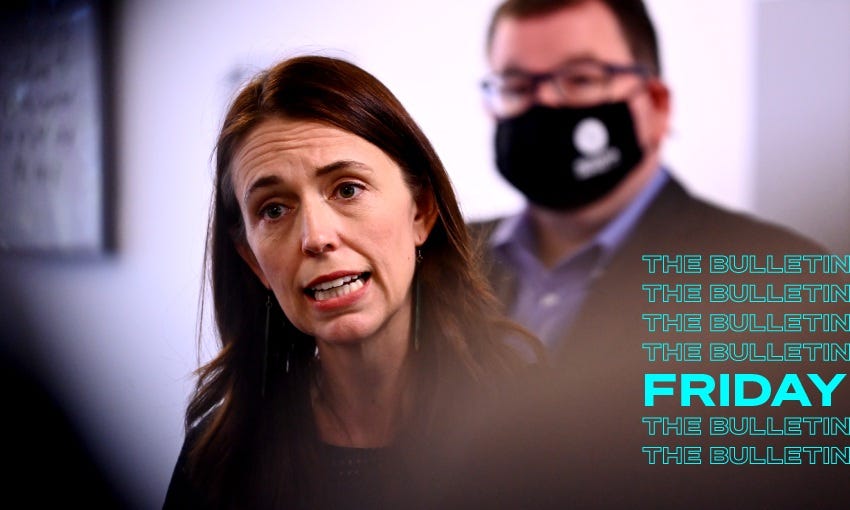There will be no omicron lockdown: PM
A national red light setting and some tinkering around the rules should get us through omicron said Ardern, but warns there will be an unprecedented number of cases
Mōrena and welcome to The Bulletin for Friday, January 21, by Justin Giovannetti. Presented in partnership with Z Energy.
In today’s edition: Food costs and rents soar in 2021; wages not likely to increase much in 2022; Coromandel’s fight to stop a mine; but first, it’s time for you to prepare for omicron.
Jacinda Ardern speaking with media before her booster shot on Monday. (Hannah Peters/Getty Images)
A different approach to Covid-19. New Zealand will move to the red setting of the traffic light system within 48 hours of a community case of omicron being detected, but there won’t be lockdowns, Jacinda Ardern confirmed yesterday. The prime minister sketched out a very different response to this variant. There won’t be elimination or containment, instead, she told New Zealanders that this is their time to prepare personally to deal with a Covid-19 infection. Despite a media statement from the prime minister’s office headlined “NZ prepared for omicron,” Stuff reports that Ardern wasn’t yet ready to unveil most of cabinet’s plan to deal with the variant.
“We need everyone to think about how they can prepare. For families, make sure your vaccines are up to date and everyone who is eligible is boosted. Think about what you need at home if you are required to isolate,” said the prime minister, speaking from the Labour caucus retreat in New Plymouth.
What does this mean? Omicron will cause case numbers higher than New Zealand has seen before, the prime minister warned. The Auckland region alone could see 1,800 daily cases, but as Stuff writes, that number has been labelled as conservative.
Perhaps what is surprising about the government’s plan is what wasn’t announced yesterday. There were no changes to the traffic light system, no big push on rapid tests or an increase in mask quality. The last two have become significant overseas, with some countries offering their residents universal access to free rapid tests and good quality N95 masks. There was also no announcement on the border, despite new MIQ bookings being postponed indefinitely this week pending a decision by cabinet.
The plan. Instead, Ardern promised in the coming days that new rules will come out on case management, the definition of close contacts and new testing requirements. As the NZ Herald reports, the prime minister said hospitals are ready for omicron after the delta outbreak. A leaked report from Auckland DHBs earlier this week showed that less than a third of ICU beds are currently available.
Reflecting on the prime minister’s comments, I have to admit it finally sunk in what’s about to happen. This country eliminated the first wave of Covid-19 and then contained delta at levels far below the dire warnings. Surely that’ll just happen a third time? It likely won’t. While I’ve written in this newsletter over previous days of the warnings and red lights from the Beehive, it’s still hard to imagine a New Zealand with thousands of daily Covid-19 cases.
An expert reaction. Jennifer Summers, an epidemiologist from the University of Otago, said the current traffic light system was designed for delta and “is not fit-for-purpose” to respond to omicron. The three light system leaves high-risk individuals and communities with less protection, she told the Science Media Centre. She also called the decision to rule out lockdowns and regional boundaries “short-sighted.” Finally, she said the government should not be waiting for community spread to respond, but should be proactive.
The future of rapid tests. A number of my friends and family overseas who have tested positive for omicron in recent weeks learned from rapid tests. They’ve been proven indispensable when traditional testing systems have been overrun by tens of thousands of daily cases. The prime minister said that the government is planning to introduce the test more widely in the coming weeks, but there are only 4.6 million in the country right now. More frequent testing will be needed in “a high-transmission environment,” she added. The current supply could be used up in as little as a week of outbreak. As RNZ writes, National leader Christopher Luxon called the government’s rapid testing rollout “appalling slow” and less than one test per person won’t cut it. Rapid tests are currently only available to asymptomatic, unvaccinated domestic travellers.
Industry calls for more financial support to face omicron. While businesses can remain open to smaller groups of vaccinated customers under the red setting, the NZ Herald reports that Auckland business leaders say they’ll need financial support if they can’t host large events. Retail and hospitality in Auckland fear they’ll get hit again. For a vision of what might await New Zealand, look across the Tasman. The Guardian reports that Australian prime minister Scott Morrison has proposed allowing children to drive forklifts to help ease a staff crisis that has hit supply chains and supermarkets. Most state premiers have responded with amazement. One former union boss reminded the prime minister that forklifts are really dangerous, “they are not dodgem cars.”
Food prices and average rent up sharply over 2021. One of the major stories of this year will be how New Zealand and the world deal with the soaring cost of nearly everything. RNZ reports that food prices were up 4.5% in 2021, driven in part by a near doubling in tomato prices. Oddly, cheaper avocados helped offset the high price of everyone’s bruschetta. Rents for new tenancies rose by 5.8%, Stuff reports. That could reflect the market bouncing back after rent freezes in 2020, but also is a sign of a lasting shortage of rentals. The head of the property investor federation said a 5.8% annual increase was reasonable as tenants need to cover increasing mortgage and maintenance costs.
What isn’t soaring is wages, as a new business index shows little appetite to increase pay. A strong job market with minimal unemployment should lead to increased wages, but that isn’t happening, according to BusinessDesk. Despite the anecdotes of pay hikes, a survey shows that worker expectations of future increased earnings actually fell at the end of last year. One reason might be that the rate of workers leaving their jobs for other opportunities actually slowed after the start of lockdown in August, giving them less leverage to ask for pay increases.
First relief gets to Tonga, navy prepares to send third ship. Less than a week after the eruption of the Hunga-Tonga-Hunga-Ha'apai volcano, the HMNZS Wellington has arrived in Tonga. As RNZ reports, relief efforts are now being stepped up as the country’s airport reopens and large shipments of supplies arrive. However, as Australians land in Tonga to help, there’s fears that Covid-19 could come with them, according to ABC.
An uncompleted stormwater system behind Transmission Gully delays. The Dominion Post reports that a new competition date for the long-delayed project could be announced in mid-February, more than two months after its last deadline. The motorway was initially supposed to open in April 2020. The lack of a functioning stormwater system that treats road run-off seems to be the latest culprit for delay. In December, issues were raised with the motorway’s poorly finished road surface.
A growing fight in Coromandel to stop a mine. A proposal to extend a gold mine into conservation land at the peninsula’s southern end has elicited local anger, with billboards and signs going up along Coromandel roads. A group told One News that they want Labour to live up to a 2017 campaign promise not to allow new mines. OceanaGold has said it’ll ask for a resource consent this year to go forward with the project. The conservation minister said she’ll wait to see the application before making a decision.
Got some feedback about The Bulletin, or anything in the news?
Get in touch with me at thebulletin@thespinoff.co.nz
Right now on The Spinoff: Chris Schulz ranks all the greatest moments from the Big Day Out. Alex Casey dives into cold water to find where NZ’s party ice is made. Mirjam Guesgen (partner content) looks into how we are trying to predict and prepare for the floods of the future. Charlotte Muru-Lanning reviews a documentary about the female-led resistance against nuclear weapons in the 1980s. Dylan Reeve turns the lens on himself and looks at how the internet has impacted his life.
Olympians warned to use burner phones at Beijing games. Security flaws found in the Olympic app for athletes and visiting dignitaries are one of the cyber issues being raised about next month’s games. As RNZ reports, national teams around the world say athletes should expect that every text, email and website they visit while in China will be monitored. They’re being told to leave their personal devices at home, with disposable phones and laptops being offered.
That's it for The Bulletin. If you want to support the work we do at The Spinoff, please check out our membership programme.







